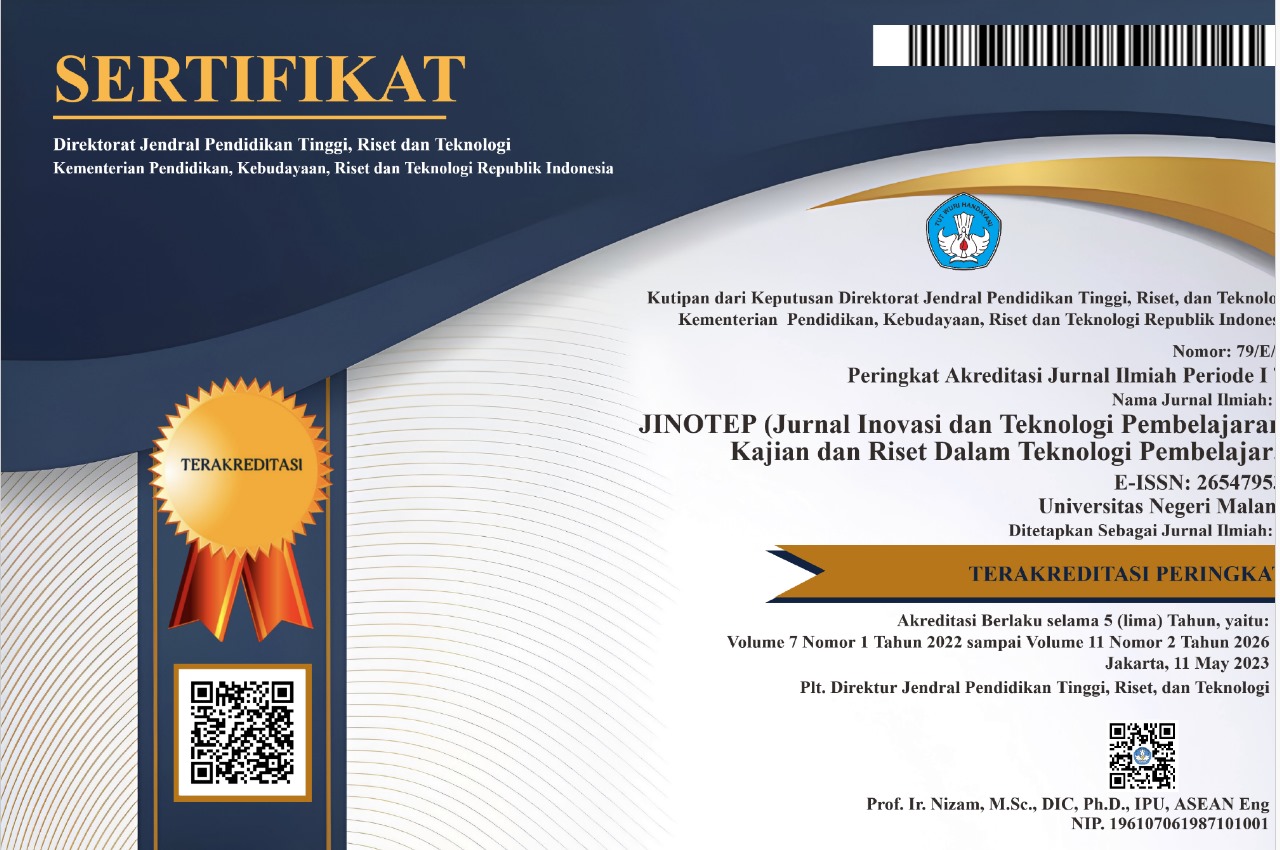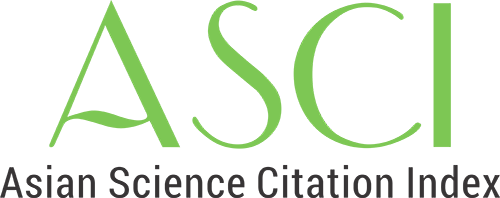Pemanfaatan Teknologi Informasi dan Komunikasi Dalam Pembelajaran oleh Guru SMK Di Banda Aceh dalam Upaya Implementasi Kurikulum 2013
Abstract
Abstrak: Pemanfaatan Teknologi Informasi dan Komunikasi (TIK) memiliki keunggulan dibandingkan cara-cara tradisional, dimana terlihat dalam hal efektivitas dan efisiensi. Kompetensi penting dimiliki oleh guru salah satunya penguasaan TIK. Tujuan dari penelitian ini yaitu menganalisis dan mendeskripsikan pemanfaatan TIK yang dilakukan guru-guru SMK di Banda Aceh dalam perencanaan, proses dan evaluasi pembelajaran. Berdasarkan studi di beberapa Sekolah Menengah Kejuruan yang berada di kota Banda Aceh, ditemukan bahwa ada divergensi terhadap pemanfaatan TIK oleh setiap guru mata pelajaran sekolah kejuruan. Penelitian ini menggunakan metode survei lapangan. Subjek penelitian ini adalah guru sebanyak 30 orang. Kesimpulan yang diperoleh > 80% guru memanfaatkan TIK dalam perencanaan pembelajaran, tetapi <70% memanfaatkan TIK sebagai dalam proses pembelajaran dan juga <70% memanfaatkan TIK sebagai alat evaluasi pembelajaran.
Abstract: ICT is now more widely used because it has advantages compared to traditional methods which are seen in terms of effectiveness and efficiency. One of the important competencies possessed by the teacher is mastery of ICT. The purpose of this study is to analyze and describe the use of ICT by the teacher in the planning, process and evaluation of learning. The approach taken in this research is survey research where it is descriptive in nature. Based on studies in several SMK “Sekolah Menengah Kejuruan” (Vocational High Schools) located in Banda Aceh, researchers found a difference in the use of ICT by each teacher in vocational school subjects. This methods used in field research. The subjects of this study were 30 teachers who could be sampled. This teacher who was studied was not a teacher who taught only computer learning. Conclusions obtained> 80% of teachers use ICT in learning planning, but <70% use ICT as a learning process and also <70% use ICT as a learning evaluation tool.
Keywords
Full Text:
PDFReferences
Al‐Mashari, M., & Zairi, M. (2000). Supply‐chain re‐engineering using enterprise resource planning (ERP) systems: an analysis of a SAP R/3 implementation case. International Journal of Physical Distribution & Logistics Management.
Anbarini, R. (2013). Terobosan kemdikbud 2010-2013 menyiapkan generasi emas 2045. Jakarta: Pusat Informasi dan Hubungan Masyarakat Kementerian Pendidikan dan Kebudayaan. Jakarta: Pusat Informasi dan Hubungan Masyarakat (PIH) Kementrian Pendidikan dan Kebudayaan Tahun 2013.
Ani, Y. (2013). Penilaian Autentik dalam Kurikulum 2013. Seminar Nasional Implementasi Kurikulum, 742–749.
Arikunto, S. (2010). Prosedur Penelitian Suatu Pendekatan Statistik. Jakarta: Salemba Medika.
Arikunto, S. (2019). Prosedur penelitian.
Bulle, N. (2019). Student’s activity and development: Disentangling secondary issues from the heart of the matter. Educational Research Review, 27(July 2018), 56–70. https://doi.org/10.1016/j.edurev.2018.12.004
Darling-Hammond, L. (2000). How teacher education matters. Journal of Teacher Education, 51(3), 166–173. https://doi.org/10.1177/0022487100051003002
Davenport, T. H., & Short, J. E. (1990). The new industrial engineering: information technology and business process redesign.
Hammer, M., & Champy, J. (1993). Reengineering the corporation. 1993. HaperCollins, New York, 50.
Indonesia., P. R. (2008). Peraturan Pemerintah Nomor 74 Tahun 2008 tentang Guru. Peraturan Pemerintah.
Jenkins, E. W. (2000). Research in science education: Time for a health check?
Krathwohl, D. R. (2002). A revision of Bloom’s taxonomy: An overview. Theory into practice, 41(4), 212–218.
Matthews, D. (1999). The origins of distance education and its use in the United States. The Journal, 27(2).
Milner IV, H. R. (2020). Fifteenth Annual AERA Brown Lecture in Education Research: Disrupting Punitive Practices and Policies: Rac (e) ing Back to Teaching, Teacher Preparation, and Brown. Educational Researcher, 0013189X20907396.
Moore, J. L., Dickson-Deane, C., & Galyen, K. (2011). E-Learning, online learning, and distance learning environments: Are they the same? Internet and Higher Education, 14(2), 129–135. https://doi.org/10.1016/j.iheduc.2010.10.001
Mulyasa, E. (2013). Development and Implementation of Curriculum 2013. Bandung: Remaja Rosdakarya.
Noor, I. H. (2011). Evaluasi Penyelenggaraan Sekolah Bertaraf Internasional (SBI) di Sekolah Dasar (SD), Sekolah Menengah Pertama (SMP), Sekolah Menengah Atas (SMA), dan Sekolah Menengah Kejuruan (SMK). Jurnal Pendidikan dan Kebudayaan, 17(2), 254. https://doi.org/10.24832/jpnk.v17i2.22
Nurdyansyah, N., & Fahyuni, E. F. (2016). Inovasi Model Pembelajaran Sesuai Kurikulum 2013. Nizamia Learning Center.
Pendidikan, M., Kebudayaan, D. A. N., & Indonesia, R. (2013). Menteri pendidikan dan kebudayaan republik indonesia. 2011, 2013–2015.
Prajana, A. (2017). Pemanfaatan Aplikasi Whatsapp Untuk Media Pembelajaran Dalam Lingkungan Uin Ar-Raniry Banda Aceh. Cyberspace: Jurnal Pendidikan Teknologi Informasi, 1(2), 122. https://doi.org/10.22373/cs.v1i2.1980
Prajana, A., Sains, F., Universitas, T., Negeri, I., Raniry, A., & Aceh, B. (2016). Penerapan Teory Rough Set Untuk Memprediksi Tingkat Kelulusan Siswa Dalam Ujian Nasional Pada Sma Negeri 5 Kota Banda Aceh. Journal of Islamic Science and Technology, 2(1), 75–88. Diambil dari www.jurnal.ar-raniry.com/index.php/elkawnie
Santi, M., & Prajana, A. (2019). Analisis Implementasi Ujian Nasional Berbasis Komputer dengan Ujian Berbasis Kertas di SMPN 2 Ingin Jaya Kabupaten Aceh Besar. Cyberspace: Jurnal Pendidikan Teknologi Informasi, 2(2), 84–91.
Sudjana, N. (2009). dan Ibrahim.(2012). Penelitian dan Penilaian Pendidikan. Bandung: Sinar Baru Algesindo.
Usman, N. (2017). Kinerja Guru Dalam Implementasi Kurikulum 2013 pada SMA Negeri 5 Lhokseumawe Penyelenggaraan pendidikan di Indonesia Indikator- indikator Kinerja Guru. 5(4), 211–217.
Wijayanti, I. D. (2011). Peningkatan Pendidikan Berbasis ICT. UIN Sunan Kalijaga: Yogyakarta.
DOI: http://dx.doi.org/10.17977/um031v7i12020p033
Refbacks
- There are currently no refbacks.
Copyright (c) 2020 Andika Prajana, Yuni Astuti

This work is licensed under a Creative Commons Attribution-ShareAlike 4.0 International License.
======================================================================
Jurnal Inovasi dan Teknologi Pembelajaran published by Universitas Negeri Malang in collaboration with the Asosiasi Program Studi Teknologi Pendidikan Indonesia (APS TPI) and Ikatan Profesi Teknologi Pendidikan Indonesia (IPTPI) with a MoU.
Publisher Address:
Educational Technology Laboratorium, Building D5, 1st Floor
Faculty of Education, Universitas Negeri Malang
Semarang St. No. 5, Malang City, East Java Province, Postal Code 65145
Email: jinotep.fip@um.ac.id
======================================================================

JINOTEP is licensed under a Creative Commons Attribution-ShareAlike 4.0 International License.
JINOTEP Statistics (Since July 13th, 2020)


.png)




.png)
1.png)
1.png)
4.png)
2.png)
1.png)
1.png)
.png)


_3.png)





1.png)
.png)